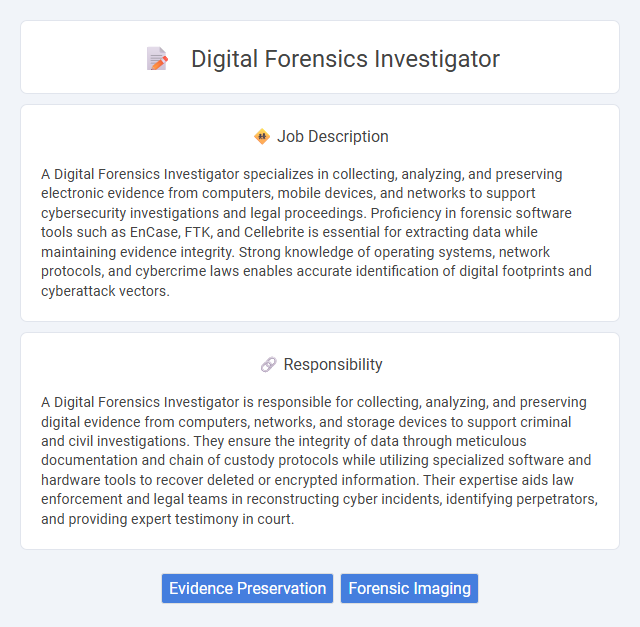
A Digital Forensics Investigator specializes in collecting, analyzing, and preserving electronic evidence from computers, mobile devices, and networks to support cybersecurity investigations and legal proceedings. Proficiency in forensic software tools such as EnCase, FTK, and Cellebrite is essential for extracting data while maintaining evidence integrity. Strong knowledge of operating systems, network protocols, and cybercrime laws enables accurate identification of digital footprints and cyberattack vectors.
Individuals with strong analytical skills and attention to detail are likely suited for a digital forensics investigator role, given the complex nature of uncovering cyber evidence. Those comfortable with technology and able to work methodically under pressure may find this career fitting. People who prefer routine or lack patience for meticulous investigation might struggle in this demanding environment.
Qualification
A Digital Forensics Investigator must possess advanced knowledge in computer science, cybersecurity, and forensic methodologies, often holding certifications such as Certified Computer Forensics Examiner (CCFE) or GIAC Certified Forensic Analyst (GCFA). Proficiency in analyzing digital evidence, using forensic tools like EnCase and FTK, and understanding operating systems and network protocols is essential. Strong analytical skills and attention to detail ensure accurate recovery and interpretation of data critical to legal investigations.
Responsibility
A Digital Forensics Investigator is responsible for collecting, analyzing, and preserving digital evidence from computers, networks, and storage devices to support criminal and civil investigations. They ensure the integrity of data through meticulous documentation and chain of custody protocols while utilizing specialized software and hardware tools to recover deleted or encrypted information. Their expertise aids law enforcement and legal teams in reconstructing cyber incidents, identifying perpetrators, and providing expert testimony in court.
Benefit
A digital forensics investigator likely gains valuable skills in uncovering and analyzing cybercrime evidence, enhancing career opportunities in cybersecurity and law enforcement. This role probably offers the chance to work on high-impact cases that contribute to justice and security. Professionals in this field may also benefit from strong job stability due to the growing demand for digital crime specialists.
Challenge
Digital forensics investigators likely face significant challenges in keeping up with rapidly evolving technology and sophisticated cybercrime techniques. The probability of encountering encrypted data or damaged devices may complicate evidence extraction and analysis. Continuous learning and adaptation seem essential to overcoming the dynamic obstacles within this field.
Career Advancement
Digital forensics investigators advance their careers by gaining expertise in advanced cybercrime analysis, malware detection, and legal compliance, often progressing to roles such as forensic examiners, cybersecurity analysts, or forensic consultants. Certifications like Certified Computer Examiner (CCE) and GIAC Certified Forensic Analyst (GCFA) enhance job prospects and open opportunities in law enforcement agencies, corporate security, and private consulting firms. Mastery of emerging technologies, including cloud forensics and artificial intelligence, positions professionals for leadership roles and specialized investigative assignments.
Key Terms
Evidence Preservation
Digital forensics investigators specialize in evidence preservation by meticulously capturing and securing digital data from devices to prevent tampering or loss. They employ write-blockers and cryptographic hashing to maintain the integrity of evidence throughout the investigation process. Proper chain-of-custody documentation is critical to ensure admissibility of digital evidence in legal proceedings.
Forensic Imaging
Digital forensics investigators specialize in forensic imaging to create exact, bit-by-bit copies of digital media, preserving data integrity for analysis and legal proceedings. Mastery of tools like EnCase, FTK Imager, and dd ensures extraction of comprehensive evidence without altering original files. Forensic imaging is critical for recovering deleted data, analyzing file structures, and maintaining a verifiable chain of custody in cybercrime investigations.
 kuljobs.com
kuljobs.com